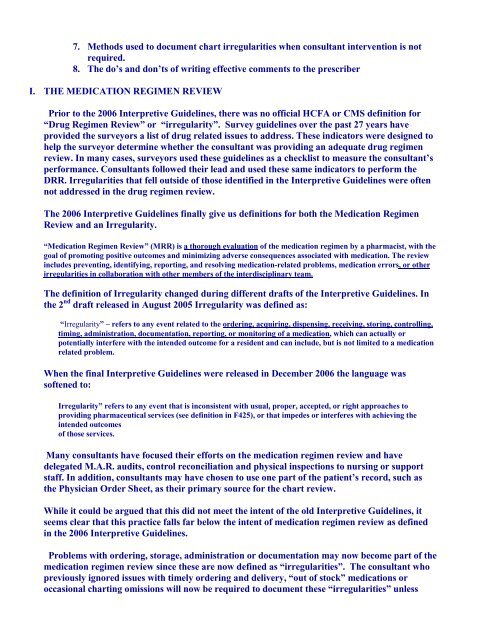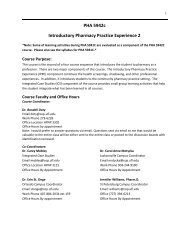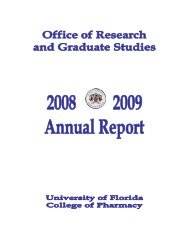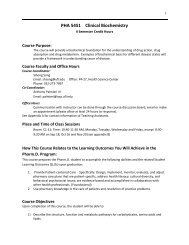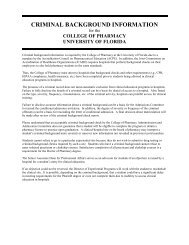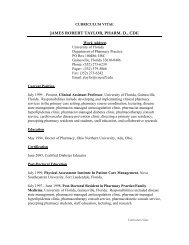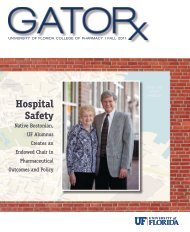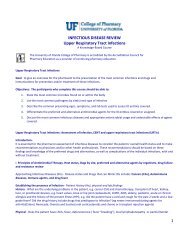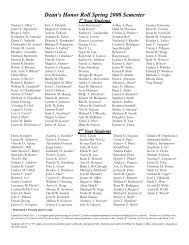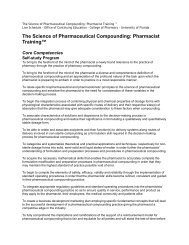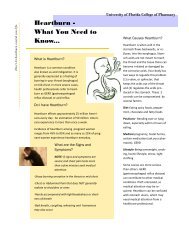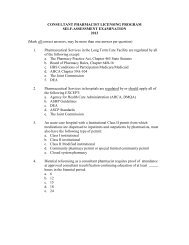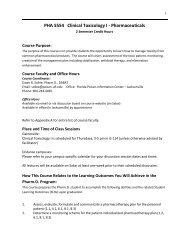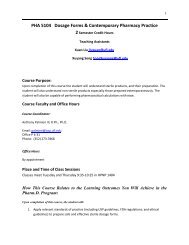Module 3: The Drug Regimen Review - College of Pharmacy ...
Module 3: The Drug Regimen Review - College of Pharmacy ...
Module 3: The Drug Regimen Review - College of Pharmacy ...
You also want an ePaper? Increase the reach of your titles
YUMPU automatically turns print PDFs into web optimized ePapers that Google loves.
7. Methods used to document chart irregularities when consultant intervention is not<br />
required.<br />
8. <strong>The</strong> do’s and don’ts <strong>of</strong> writing effective comments to the prescriber<br />
I. THE MEDICATION REGIMEN REVIEW<br />
Prior to the 2006 Interpretive Guidelines, there was no <strong>of</strong>ficial HCFA or CMS definition for<br />
“<strong>Drug</strong> <strong>Regimen</strong> <strong>Review</strong>” or “irregularity”. Survey guidelines over the past 27 years have<br />
provided the surveyors a list <strong>of</strong> drug related issues to address. <strong>The</strong>se indicators were designed to<br />
help the surveyor determine whether the consultant was providing an adequate drug regimen<br />
review. In many cases, surveyors used these guidelines as a checklist to measure the consultant’s<br />
performance. Consultants followed their lead and used these same indicators to perform the<br />
DRR. Irregularities that fell outside <strong>of</strong> those identified in the Interpretive Guidelines were <strong>of</strong>ten<br />
not addressed in the drug regimen review.<br />
<strong>The</strong> 2006 Interpretive Guidelines finally give us definitions for both the Medication <strong>Regimen</strong><br />
<strong>Review</strong> and an Irregularity.<br />
“Medication <strong>Regimen</strong> <strong>Review</strong>” (MRR) is a thorough evaluation <strong>of</strong> the medication regimen by a pharmacist, with the<br />
goal <strong>of</strong> promoting positive outcomes and minimizing adverse consequences associated with medication. <strong>The</strong> review<br />
includes preventing, identifying, reporting, and resolving medication-related problems, medication errors, or other<br />
irregularities in collaboration with other members <strong>of</strong> the interdisciplinary team.<br />
<strong>The</strong> definition <strong>of</strong> Irregularity changed during different drafts <strong>of</strong> the Interpretive Guidelines. In<br />
the 2 nd draft released in August 2005 Irregularity was defined as:<br />
“Irregularity” – refers to any event related to the ordering, acquiring, dispensing, receiving, storing, controlling,<br />
timing, administration, documentation, reporting, or monitoring <strong>of</strong> a medication, which can actually or<br />
potentially interfere with the intended outcome for a resident and can include, but is not limited to a medication<br />
related problem.<br />
When the final Interpretive Guidelines were released in December 2006 the language was<br />
s<strong>of</strong>tened to:<br />
Irregularity” refers to any event that is inconsistent with usual, proper, accepted, or right approaches to<br />
providing pharmaceutical services (see definition in F425), or that impedes or interferes with achieving the<br />
intended outcomes<br />
<strong>of</strong> those services.<br />
Many consultants have focused their efforts on the medication regimen review and have<br />
delegated M.A.R. audits, control reconciliation and physical inspections to nursing or support<br />
staff. In addition, consultants may have chosen to use one part <strong>of</strong> the patient’s record, such as<br />
the Physician Order Sheet, as their primary source for the chart review.<br />
While it could be argued that this did not meet the intent <strong>of</strong> the old Interpretive Guidelines, it<br />
seems clear that this practice falls far below the intent <strong>of</strong> medication regimen review as defined<br />
in the 2006 Interpretive Guidelines.<br />
Problems with ordering, storage, administration or documentation may now become part <strong>of</strong> the<br />
medication regimen review since these are now defined as “irregularities”. <strong>The</strong> consultant who<br />
previously ignored issues with timely ordering and delivery, “out <strong>of</strong> stock” medications or<br />
occasional charting omissions will now be required to document these “irregularities” unless


